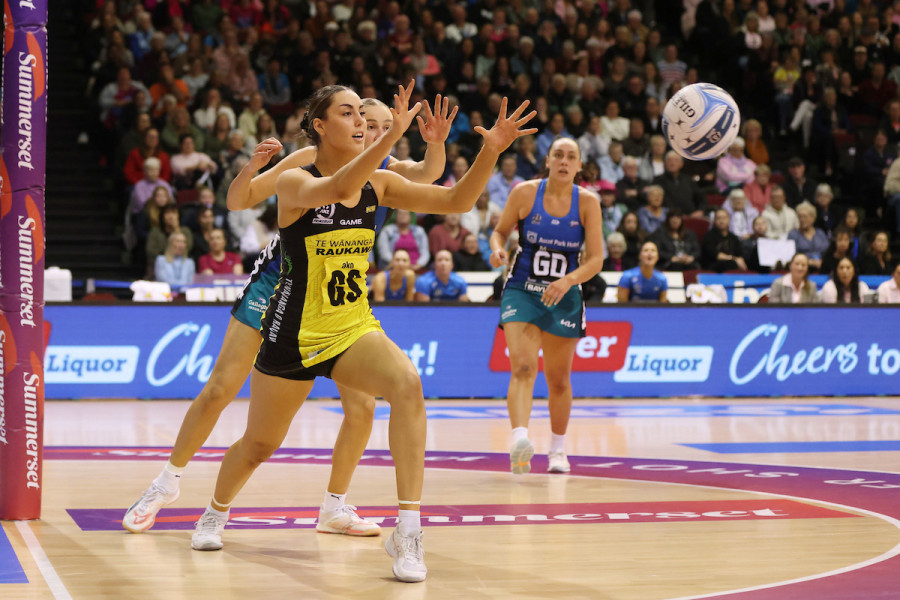Netball Untamed: Amelia Walmsley

“Playing Untamed Means Playing With Immense Passion and the Courage to be Fierce and Fearless”
Netball, a non-contact sport? Mate, you’re dreaming! As our sport grows and evolves to dizzying new heights of physicality, skill and speed, we chat to our ANZ Premiership players about what playing ‘untamed’ means to them, and how they’re adapting their own gameplay to rise and meet the new challenges – and exciting opportunities! – that arise from netball’s new era.
For Pulse star shooter Amelia Walmsley, the increasing physicality of netball is a progression she not only embraces, but welcomes. Now in her fourth season at the Pulse, she’s excited for 2025 after her 2024 season was marred by injuries. For her, ‘untamed’ means everything, not just in netball, but in life!
Kia ora Amelia! Tell us, what does the word “untamed” mean to you, both in life and in netball?
To me, "untamed" in life reflects living with freedom. It means that I am not restricted by expectations, rules, or social norms to be or live a certain way. An untamed life is living boldly and freely to write my own story. In terms of netball, "untamed" to me is playing with immense passion. It's about having the courage to be fierce and fearless, pushing my limits, and being an exciting player to play against and watch.
How has your netball style changed as you’ve gone on in your career? Do you play the game differently than you used to?
I think that as I continue to gain more experience and develop my own playing identity, my style has changed. Earlier in my career, I thought that I had to be good at everything in the game. Now that I have become more confident in what I offer as a player, I choose to play to my strengths. I have also had to adapt to the change in physicality as time has gone on.
What’s the toughest part of your role on the court, do you think, and how do you train or prepare for it?
As a shooter, our role puts us under a lot of pressure. We are the ones who have to create space to receive a ball and get it through the hoop in order to win games. In really high-pressure moments, you have to be mentally strong to have that performance edge and overcome this challenge. A shooter's role is incredibly psychological, and therefore, it is important for us to be mentally strong to best prepare for these high-pressure moments.
How many hours of training do you do a week during the season, and what is one part of your training that may surprise people?
In season, I wouldn't know the hours that we train, but it roughly looks like five or six out of seven days a week. This covers two or three gym sessions, three (90 or 120 minute) court sessions, one match play, the game day, analysis, meetings and physio, etc. One part of our training that may surprise people is that our sessions are targeted to different topics; we have positional skillset trainings, pressure set trainings, mastery sessions, that kind of thing. And we still do conditioning in season on top of training and games.
That is a lot of training! We know just how much physical strength is required to play netball, but mental strength is equally important. What do you do to stay mentally sharp and well?
I have worked hard on this over the years, and I think it comes down to having a super-clear plan on game-day processes to ensure you are locked in mentally. I have a mental reset plan and I know what to do if I find myself in a position of stress.
There's still a perception that netball is exclusively a women's sport. How do you view the increasing participation of men and boys in netball, and what impact does this have on the sport's evolution?
The growing participation of men and boys in netball is breaking down gender stereotypes. It allows for more inclusivity. I think it brings new, fresh talent, creates new competitive opportunities, and evolves netball into a more dynamic game. There are still major funding issues in this area, but I think it is becoming better, and there has been a big shift in the inclusivity of all genders, which is important for the future of the sport.
Netball used to be seen as a ‘gentle’ sport - a ‘feminine’ alternative for women to play. Obviously nothing is further from the truth in 2025! But do you think there’s elements of that perception that still remains to this day, and how do you like to set the record straight?
People sometimes do still think of it as “gentle” or less intense because of its roots as a women’s sport, however, anyone who’s played or watched a high-level game (especially live) knows that it is far from "gentle" these days! It is no longer a "non-contact" sport. I prepare myself mentally going into games for the physicality of it. I think the shift now is that it's not about proving it's "as tough as" any other sport, but it's about growing the understanding of the unique strength and skill that makes netball its own kind of powerful.
What’s the biggest sacrifice you make in order to play professional netball?
Being a professional netball player is the coolest job ever, one that I dreamed of for years. To this day, I am still so grateful for what I do, but with this job comes its challenges. It consumes a lot of your time, your weekends, and with this means you sacrifice missing out on important milestones and time with loved ones. I live away from home, my family, my sisters, and my friends back home for a large part of the year for this sport.
If you could give advice to anyone taking the court this year who wants to tap into their untamed side?
Do not hold back and give it everything. Take risks, let the passion you have for this game drive you. I think it's important to back yourself 100%, you have done all the work to get yourself to this point, now reward yourself by leaning into what "untamed" looks like for you, and having the best time ever.






